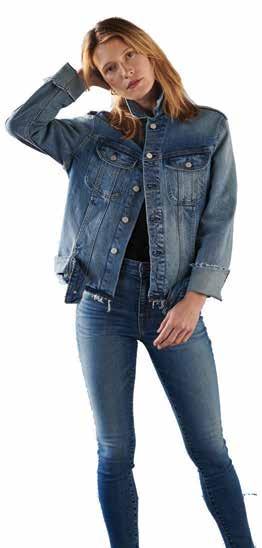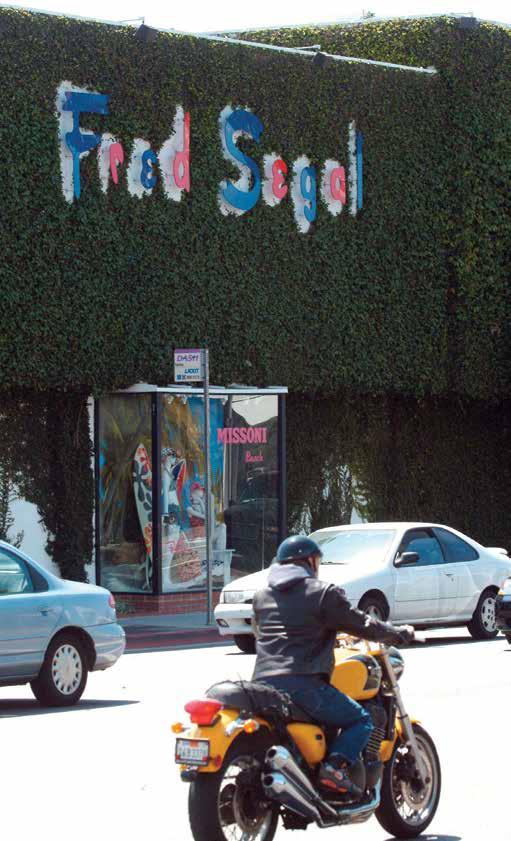
8 minute read
CALI C-SUITE Executives of Los Angeles-based brands dish on what it means to be a part of the city’s denim community.
from Rivet April 2020
words
_____LIZ WARREN
and CEO, Reformation How would you define your brand proposition?
At Reformation, our mission is to bring sustainable fashion to everyone. I started Reformation in 2009 to prove that “green” fashion didn’t mean compromising style. Reformation is about changing the world’s view on the fashion industry, educating consumers about the powerful effect we can all have on the environment, and using our brand to inform the industry that it can be done in a sustainable way.
Is premium denim today dictated by cost or some other measure?
Premium denim is still defined by how it’s manufactured. But what is changing is the awareness that denim is pretty much the worst clothing for the environment. Our main priority with Ref Jeans is to create great-fitting denim, with the smallest environmental impact as possible.
What are the challenges of manufacturing in L.A.?
Reformation created America’s first sustainable apparel factory in L.A., and in 2019, 68 percent of our production was L.A.-based. A big challenge has been scaling production and product assortment to keep up with customer demand—there are certain items that can’t be made in our factory or in L.A. at all, forcing us to expand to other sustainable manufacturing partners in the U.S. and abroad. For any partner factories that we work with, we have a rigorous screening process to make sure they share our values of sustainability, transparency and accountability. We require all of our direct cut, sew and finish manufacturing partners to adhere to our Code of Conduct (which represents international standards for fair labor practices and safe working conditions) and to be monitored for compliance and continuous improvement.
What’s new for F/W 20-21?
With new collections, we’re always looking for ways to bring sustainable fashion to ever yone—whether that’s through sizing, design or fabrication. We’ve been introducing even more vintage-inspired styles in new cuts and fits to our Ref Jeans collection, and we’re using sustainable and innovative fibers like organically grown cotton, recycled elastane, Tencel Lyocell and Refibra.
What does it mean to be part of the L.A. denim industry’s legacy?
L.A. is known for producing some of the world’s best denim, and it’s exciting to be a part of that legacy, but it’s also time for us to set the new standard with sustainable denim production. Traditional denim requires a large amount of cotton, water and harmful chemicals; a typical pair of jeans takes approximately 1,500 gallons of water to make. According to our RefScale tool, a pair of Reformation jeans uses an average of 200 gallons to make, saving over 1,300 gallons per pair. We also save approximately 80 percent of the waste and more than 70 percent of CO2 emissions compared to a typical pair of jeans. We’re excited to be leading the way in sustainability and to make sustainable
manufacturing the status quo; our goal is to push not only the L.A. industry, but the entire industry forward and to encourage change among other denim brands.
YUL KU, CEO, AG Jeans
How would you define your brand proposition?
Our brand proposition is simple: Fabric is king and construction is queen. There is a noticeable difference between the denim we source from Italy or Japan and a lot of the denim you see in the market—that and how we choose to construct that denim sets us apart. AG’s vertically integrated model allows us to own the entire process in a way that other companies can’t. It allows us to pivot quickly and innovate mindfully. Not only can we keep a close eye on the quality of our products, but we can change the way we manufacture as soon as we find new solutions.
TKTK
Is premium denim today dictated by cost or some other measure?
The difference between fast fashion and premium denim isn’t dictated by cost, but by the product. What makes a premium denim product “premium” is the construction, fabric source, industry experience and ethical manufacturing. Combined, these aspects can be costly for both the denim maker and the denim wearer, but it’s a commitment you have to make as a leader in denim innovation. The decision to invest in quality, by product standards and in business, isn’t for us; it’s for the future of denim making as a whole. Premium denim brands are rightfully being held to a higher standard, and we plan on raising that bar even higher.
What are the challenges of manufacturing in L.A.?
There are a lot of factors working against an L.A.- based denim manufacturer. The overhead cost alone has already led many denim factories to close their doors over the last 10 years. It’s definitely not easy, but I think the biggest challenge of being in L.A. is also our biggest strength. Our factory is company-owned, meaning I can go directly to the factory and check the quality of our product at any time. When I have that kind of access to our production, I see what other companies may not notice until months later. Through this flexibility, we not only respond more quickly, but we deliver results faster.
What do L.A. brands excel in?
The history of denim and the history of California are intertwined. California is the birthplace of the five-pocket jean as we know it now, and L.A. has long since been the epicenter of global denim manufacturing. With its abundance of expertise in raw materials and production, you can’t put a price tag on what being an L.A.-based brand means. There is nothing that comes close to the years of experience and historical ties that L.A. brands have. For example, there are people who have worked alongside me in the denim business for over 20 years. I see generations of families come through AG’s doors. There is a certain loyalty when you’re dealing with something that has so much history. So, no matter where you’re making your jeans, there is always an aspect of the city in the denim. It’s just that much better when you’re in L.A., being part of the history of denim.
What’s new for F/W 20-21?
Our fall collection is a nod to Americana—an era of quality manufacturing and American style, but taking that concept and modernizing it with our current times and what it means to be pursuing that ideology today. Fall ’20 marks our 20- year anniversary, so it’s an important collection for us. It will continue to be inspired by vintage, but focused on sustainable fashion. New fabrics like 100 percent Tencel are made from certified compostable and biodegradable fibers. Not only is it better for the environment, it’s extremely soft, just like your favorite flea market T-shirt. For
" P R E M I U M D E N I M B R A N D S A R E R I G H T F U L L Y
B E I N G H E L D T O A H I G H E R S TA N DA R D ...” —Yul Ku, AG Jeans
men’s denim, we are introducing a new type of denim that uses organic and recycled cotton. It’ll be dyed with a dry indigo process and use 89 percent fewer chemicals. Even though the fall collection will conclude the last 20 years for AG, it will pave the way for the next 20 years of our legacy.

What does it mean to be part of the L.A. denim industry’s legacy?
Being a part of the L.A. denim industry’s legacy means continuing to be a torch bearer for the industry. What we’re doing in L.A. is investing in better business and helping pave the way for other companies to follow suit. This means pushing our technology past the point of innovation and continually pushing the industry to commit to better practices, including reducing our carbon footprint while increasing our sustainability and philanthropic footprints.
SAMUEL KU, president
and founder, CQY How would you define your brand proposition?
When designing CQY, we're targeting the customers who are looking for the best in design and quality. She knows great product when she sees it, and doesn't need a paid spokesperson to tell her what's cool.
Is premium denim today dictated by cost or some other measure?
This depends on the brand. Some brands produce high quality product, and some don't.
What are the challenges of manufacturing in L.A.?
There are too many to list. That being said, currently the benefits still outweigh the challenges if you want the best factories and the best final product.
What do L.A. brands excel in?
Generally speaking, the brands who produce in L.A.—and aren’t just based in L.A.—tend to have the best fits and washes. Working with factories only a couple of miles away allows for design and development teams to nail silhouettes and washes because we can work directly with factories and technicians.
What’s new for F/W 20-21?
For Fall ’20, we've got a couple of interesting fashion groups. One is a group we're calling Salvage, and we've taken one of our best vintage washed jeans and jackets and deconstructed and reconstructed them in a beautiful way. With another group, we've used Sherpa to line the hood of a denim jacket, and fully-lined a denim vest with Sherpa. Lastly, we've got a military-inspired group and added a Native American-inspired striped fabric mixing to the garments.
What does it mean to be part of the L.A. denim industry’s legacy?
We're proud to be a member of the community. I think the most important part of this is that we need to continue to support the makers and factories. Without them, we will lose every advantage that we have being here.








